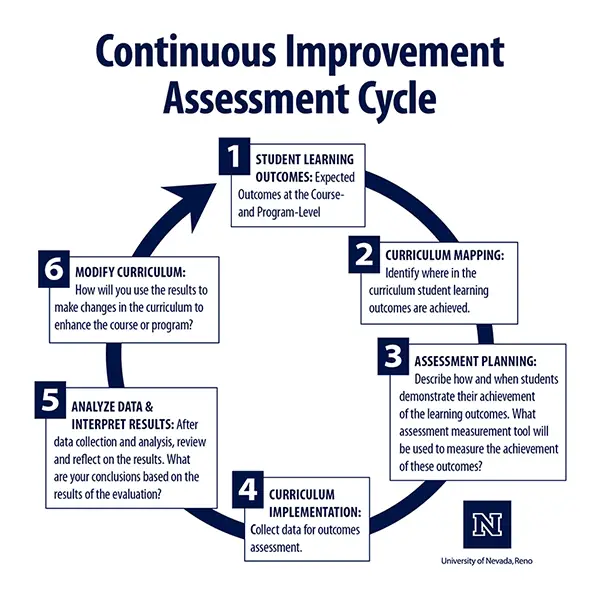About University Assessment
To gauge the attainment of the University of Nevada, Reno's first Core Theme (Learning) and to measure the efficacy of educational programming across the disciplines, we rely on assessment. Assessment is the reflective evaluation of the goals and objectives of our degree programs and of our students' success in learning, retaining, and integrating bodies of knowledge and skills encountered in the Core Curriculum, majors, and minors.
We aim to assess student learning in relation to the learning outcomes and goals established at multiple levels within the University:
- Courses
- Programs
- Institution (e.g., Core Curriculum)
Assessment for Continuous Improvement
Assessment is an ongoing and cyclical process that consists of developing plans that specify specific learning outcomes, implementing plans, collecting data to gauge the extent to which the expected outcomes are achieved, and using the analysis of assessment results to modify and adapt programing for continuous improvement.
Continuous Improvement Assessment Cycle
- Student Learning Outcomes: Expected Outcomes at the Course- and Program-Level
- Curriculum Mapping: Identify where in the curriculum student learning outcomes are achieved.
- Assessment Planning: Describe how and when students demonstrate their achievement of the learning outcomes. What assessment measurement tool will be used to measure the achievement of these outcomes?
- Curriculum Implementation: Collect data for outcomes assessment.
- Analyze Data & Interpret Results: After data collection and analysis, review and reflect on the results. What are your conclusions based on the results of the evaluation?
- Modify Curriculum: How will you use the results to make changes in the curriculum to enhance the course or program?

Watermark
Watermark’s Planning & Self Study (P&SS) is a web-based planning and management platform that supports institutional accreditation, course assessment, program review, and strategic planning. P&SS allows for the documentation, analysis, and archival of outcomes assessment at all levels of the institution, and it promotes evidence-based decision-making by integrating multiple sources of information, encouraging collaboration, and improving transparency. Common uses of P&SS include:
- Degree program assessment and review
- Annual outcomes assessment
- Curriculum mapping that allows users to align outcomes to courses
- Longitudinal reporting on outcomes and measures
- Accreditation preparation (self-studies, reaffirmations, and compliance)
- Strategic planning
Interested in learning more about Watermark?
Access to Watermark resources and training sessions for faculty and staff are available by request. This includes a one-hour session covering University processes and expectations, best practices for assessment, and a demo of Watermark.
Schedule a training appointment
Assessment Responsibilities
The role of the Provost's Office and the Associate Vice Provost for Curriculum and Assessment is to ensure that programs and faculty members receive the necessary guidance and information to conduct assessment, and to ensure that institution-, program-, and course-level assessment is completed in a symbiotic and holistic fashion.
College Assessment Coordinators
The responsibility of assessment at the college level falls to the Associate or Assistant Dean that is responsible for curriculum and assessment. The Associate or Assistant Dean is responsible for overseeing faculty Assessment Coordinators for every program within the college and will coordinate departments’ participation in the required University-wide degree program Fundamental Proficiencies Assessment (focused on CO1, CO2, and CO3 at the midpoint and mastery levels) and Core Curriculum Assessment. College Assessment Coordinators must ensure that all departments (and their assessment coordinators) within their college are trained in the Watermark platform, develop a department site for collecting, analyzing, and reporting results of assessment, and build a routine assessment program focused on the Fundamental Proficiencies and the Core Objectives.